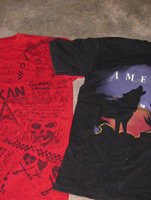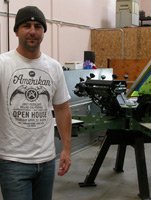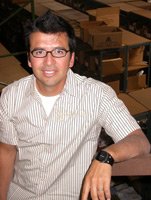Building Buzz in San Clemente
The Amerikan Project and Mada seem to be cut from the same cloth. The respective founders of the emerging action-sports apparel companies grew up skating and surfing in Southern California. They both vied to make their labels the Buzz Brand of the Year in the Surf Industry Manufacturers Association’s Image Awards. (Along with Burton Snowboard’s Analog Clothing and Electric sunglasses, they lost this year to the more established RVCA.) Despite their size—seven workers at each company and less than $8 million combined in sales—they have managed to source products from overseas factories.
They also rent offices and warehouses located some 528 feet away from each other in the same hill-surrounded business complex in San Clemente, Calif. Their employees often run into each other at a nearby Starbucks coffee shop.
But the similarities do not continue beyond that. The Amerikan Project (AP), which was started in a garage, thrives on what it considers “true Americana rebellion,” as symbolized by T-shirts and jeans. Mada was created in a studied, deliberate process by an industry veteran who previously co-founded Ezekiel Clothing. At any rate, the growing action-sports market is making room for the small labels.
“We’re always playing around with new lines,” said Eric John, who carries AP and Mada at Laguna Surf & Sport. By pioneering new brands, John said his store can differentiate itself from bigger chain retailers and attract consumers who want something different. He said Mada’s screen-printed tops and denim items sell well, as do AP’s T-shirts, sweat shirts and juniors collection. “We don’t want to offer just mature brands,” he said.
The Amerikan Project
How seriously can you take a company that extols rebellion?
You can take The Amerikan Project very seriously. AP founder Adam Port began screen-printing T-shirts about five years ago in the garage of his house, located on the beach between San Clemente and Dana Point, Calif. The corporate logo pays homage to the anarchy sign—the letter “A” scrawled inside a circle—but instead of the alphabet character there is a modified star inside the sphere. Splashed on the clothes are slogans urging people to “never fall in line” and reminding them that “the cold numb consumer vortex of modern American society will be jilted by glory.”
“We just started building the stuff we’re comfortable with, the stuff we wear,” Port said.
AP is growing up. It introduced denim and walking shorts last year. The juniors line is designed mostly by Bre Barnes, who has a business degree from San Diego State University and is now enrolled in the graduate program in apparel manufacturing at the Fashion Institute of Design & Merchandising in Los Angeles. Grady Archbold, an alumnus of the Academy of Art University in San Francisco, oversees the men’s line, which forms 70 percent of the company’s business. Barnes said designing is “very collaborative” and that the clothes are “very raw.”
“That’s why we don’t look like everyone else,” she said.
Customers like AP’s direction. It is distributed in Japan and Canada and carried by more than 100 retailers, including Beams in Japan, Sun Diego, Jack’s Surfboards and Active Ride Shop. Annual wholesale volume is projected toreach between $3 million and $5 million in 2005. AP is currently searching for a chief executive officer, a newly created position, to help it “go to the next level,” Port said.
AP’s focus is always on comfort. The tees are made of a soft, distressed fabric that is covered in paint splotches and scratches. There is simplicity, too. The floral print on boardshorts is reminiscent of 19th century scientific drawings.
Barnes said she designs for a tomboy who surfs or skates or has a boyfriend who surfs or skates. For Fall 2005, AP offers that tomboy a corduroy miniskirt that is both tough and cute. The two-tone pinwale corduroy has undergone a heavy vintage wash with discharge branding, but the inverted angled pleats, wide belt and side buttons add a stylish flair. The skirt wholesales for $25.
Other wholesale prices in the juniors line are $11 for tank tops, $12.50 to $14.50 for tees, $28 for boardshorts and $29.50 to $42.50 for jeans. For the men’s collection, wholesale prices are $9.50 to $14.50 for T-shirts, $26.50 for walking shorts, $26.50 to $45 for fleece and $29.50 to $62.50 for denim.
For more information, call (949) 443-0094.
Mada
When former professional surfer Vince de la Pena likes something, he calls it “insane.” When he likes it a lot, he also says “bitchin’” and “sick.”
Those were the words he pulled from his Orange County–influenced lexicon to denote favor for a men’s tan striped long-sleeved woven shirt in Mada’s Fall 2005 collection.
De la Pena particularly liked the high collar on the shirt, which wholesales for $26 and features a dark tonal inlay for subtle striping and discreet embroidery of the label’s crown logo, which incorporates the letter “M.”
Woven shirts have been one of Mada’s strongest sellers since it bowed its first collection of men’s surf and skate apparel in the summer of 2004. Jay Mitchell, who designs the clothes along with de la Pena’s younger brother, Alex, said that, considering the relative newness of the company, the boardshorts sell exceptionally well. He explained that young companies struggle with finding a good boardshorts contractor. Mada’s boardshorts offer hidden zipper pockets, piping, self-locking front-fly zippers, detailed embroidery and four-way stretch fabric. They wholesale for $26.
De la Pena and Mitchell, as well as some others at Mada, honed their skills at Ezekiel. A decade after co-founding Ezekiel, de la Pena left in 2003 and began working on Mada. One challenge was making up a corporate name. “My biggest concern was being able to trademark the name worldwide,” he said.
De la Pena already has signed licensing deals in Japan, Canada, Australia and Europe.
Mada is presently sold in 200 to 250 retail accounts, including Sun Diego, K-Five, Jack’s Surfboards and the Active Ride Shop. The line generated approximately $2 million in wholesale volume in its first calendar year. T-shirts feature images of bandidos and other Latin-influenced characters drawn by an East Los Angeles artist named Chato. For Spring 2006, the company will launch a collection of jeans that are made of Japanese denim and produced in Los Angeles; wholesale prices will likely be $70 to $80. The company plans to introduce a juniors line one to two years from now.
Perhaps the biggest achievement for Mada thus far is adopting a production calendar. For Spring 2006, the company will ship samples on Aug. 1, 2005, and make its first delivery on Jan. 25, 2006. It pushed up its internal schedule by 30 to 40 days.
“It’s better to be in early than to be late,” de la Pena said. Otherwise, he admitted, retailers would have used up their money on orders with other companies. Plus, if design and development lagged, then Mada would have less time to correspond with the foreign factories, would be unable to request changes such as wider pockets and would receive samples late. “The trickle-down effect is so big and so powerful,” de la Pena said. “That’s what usually puts small companies out of business.”
Mada’s jeans and woven shirts do good business at K-Five. As K-Five Manager Jurgen Schulz wrote in an e-mail, “Mada has a great future ahead of them if they can keep it tight for a while!”
For more information, call (949) 498-4725.
























